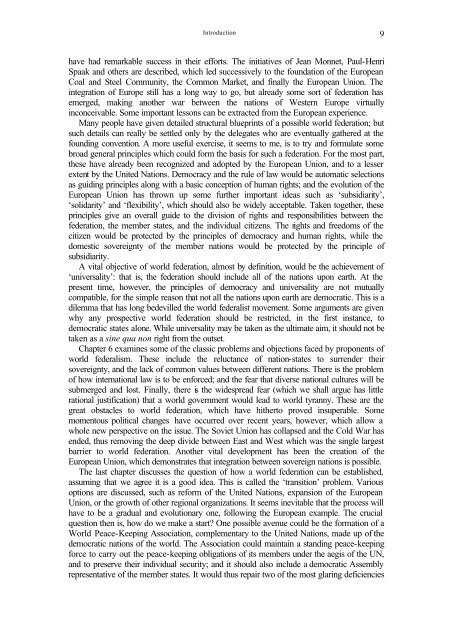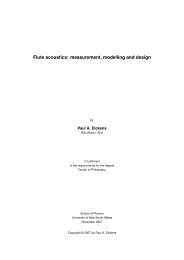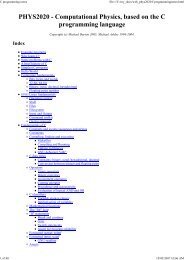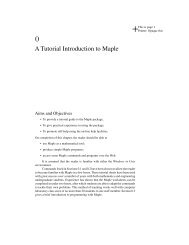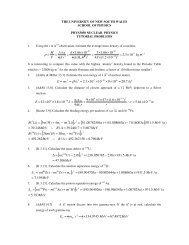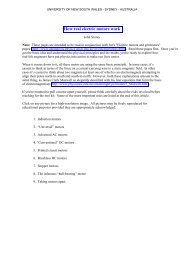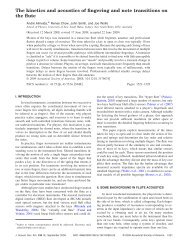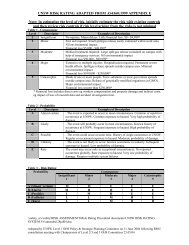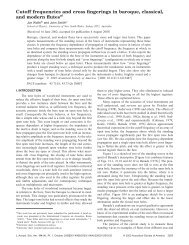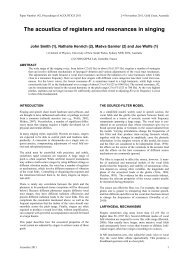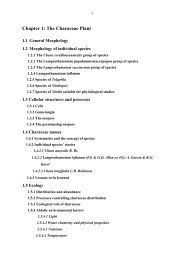8 Introduction Everybody knows that the world has become a âglobal ...
8 Introduction Everybody knows that the world has become a âglobal ...
8 Introduction Everybody knows that the world has become a âglobal ...
You also want an ePaper? Increase the reach of your titles
YUMPU automatically turns print PDFs into web optimized ePapers that Google loves.
<strong>Introduction</strong> 9<br />
have had remarkable success in <strong>the</strong>ir efforts. The initiatives of Jean Monnet, Paul-Henri<br />
Spaak and o<strong>the</strong>rs are described, which led successively to <strong>the</strong> foundation of <strong>the</strong> European<br />
Coal and Steel Community, <strong>the</strong> Common Market, and finally <strong>the</strong> European Union. The<br />
integration of Europe still <strong>has</strong> a long way to go, but already some sort of federation <strong>has</strong><br />
emerged, making ano<strong>the</strong>r war between <strong>the</strong> nations of Western Europe virtually<br />
inconceivable. Some important lessons can be extracted from <strong>the</strong> European experience.<br />
Many people have given detailed structural blueprints of a possible <strong>world</strong> federation; but<br />
such details can really be settled only by <strong>the</strong> delegates who are eventually ga<strong>the</strong>red at <strong>the</strong><br />
founding convention. A more useful exercise, it seems to me, is to try and formulate some<br />
broad general principles which could form <strong>the</strong> basis for such a federation. For <strong>the</strong> most part,<br />
<strong>the</strong>se have already been recognized and adopted by <strong>the</strong> European Union, and to a lesser<br />
extent by <strong>the</strong> United Nations. Democracy and <strong>the</strong> rule of law would be automatic selections<br />
as guiding principles along with a basic conception of human rights; and <strong>the</strong> evolution of <strong>the</strong><br />
European Union <strong>has</strong> thrown up some fur<strong>the</strong>r important ideas such as ‘subsidiarity’,<br />
‘solidarity’ and ‘flexibility’, which should also be widely acceptable. Taken toge<strong>the</strong>r, <strong>the</strong>se<br />
principles give an overall guide to <strong>the</strong> division of rights and responsibilities between <strong>the</strong><br />
federation, <strong>the</strong> member states, and <strong>the</strong> individual citizens. The rights and freedoms of <strong>the</strong><br />
citizen would be protected by <strong>the</strong> principles of democracy and human rights, while <strong>the</strong><br />
domestic sovereignty of <strong>the</strong> member nations would be protected by <strong>the</strong> principle of<br />
subsidiarity.<br />
A vital objective of <strong>world</strong> federation, almost by definition, would be <strong>the</strong> achievement of<br />
‘universality’: <strong>that</strong> is, <strong>the</strong> federation should include all of <strong>the</strong> nations upon earth. At <strong>the</strong><br />
present time, however, <strong>the</strong> principles of democracy and universality are not mutually<br />
compatible, for <strong>the</strong> simple reason <strong>that</strong> not all <strong>the</strong> nations upon earth are democratic. This is a<br />
dilemma <strong>that</strong> <strong>has</strong> long bedevilled <strong>the</strong> <strong>world</strong> federalist movement. Some arguments are given<br />
why any prospective <strong>world</strong> federation should be restricted, in <strong>the</strong> first instance, to<br />
democratic states alone. While universality may be taken as <strong>the</strong> ultimate aim, it should not be<br />
taken as a sine qua non right from <strong>the</strong> outset.<br />
Chapter 6 examines some of <strong>the</strong> classic problems and objections faced by proponents of<br />
<strong>world</strong> federalism. These include <strong>the</strong> reluctance of nation-states to surrender <strong>the</strong>ir<br />
sovereignty, and <strong>the</strong> lack of common values between different nations. There is <strong>the</strong> problem<br />
of how international law is to be enforced; and <strong>the</strong> fear <strong>that</strong> diverse national cultures will be<br />
submerged and lost. Finally, <strong>the</strong>re is <strong>the</strong> widespread fear (which we shall argue <strong>has</strong> little<br />
rational justification) <strong>that</strong> a <strong>world</strong> government would lead to <strong>world</strong> tyranny. These are <strong>the</strong><br />
great obstacles to <strong>world</strong> federation, which have hi<strong>the</strong>rto proved insuperable. Some<br />
momentous political changes have occurred over recent years, however, which allow a<br />
whole new perspective on <strong>the</strong> issue. The Soviet Union <strong>has</strong> collapsed and <strong>the</strong> Cold War <strong>has</strong><br />
ended, thus removing <strong>the</strong> deep divide between East and West which was <strong>the</strong> single largest<br />
barrier to <strong>world</strong> federation. Ano<strong>the</strong>r vital development <strong>has</strong> been <strong>the</strong> creation of <strong>the</strong><br />
European Union, which demonstrates <strong>that</strong> integration between sovereign nations is possible.<br />
The last chapter discusses <strong>the</strong> question of how a <strong>world</strong> federation can be established,<br />
assuming <strong>that</strong> we agree it is a good idea. This is called <strong>the</strong> ‘transition’ problem. Various<br />
options are discussed, such as reform of <strong>the</strong> United Nations, expansion of <strong>the</strong> European<br />
Union, or <strong>the</strong> growth of o<strong>the</strong>r regional organizations. It seems inevitable <strong>that</strong> <strong>the</strong> process will<br />
have to be a gradual and evolutionary one, following <strong>the</strong> European example. The crucial<br />
question <strong>the</strong>n is, how do we make a start? One possible avenue could be <strong>the</strong> formation of a<br />
World Peace-Keeping Association, complementary to <strong>the</strong> United Nations, made up of <strong>the</strong><br />
democratic nations of <strong>the</strong> <strong>world</strong>. The Association could maintain a standing peace-keeping<br />
force to carry out <strong>the</strong> peace-keeping obligations of its members under <strong>the</strong> aegis of <strong>the</strong> UN,<br />
and to preserve <strong>the</strong>ir individual security; and it should also include a democratic Assembly<br />
representative of <strong>the</strong> member states. It would thus repair two of <strong>the</strong> most glaring deficiencies


